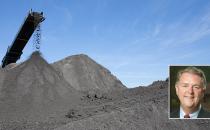Alabama’s draft coal ash rules fall far short
Closing the public comment period on its draft coal ash storage and disposal rules, the Alabama Department of Environmental Management held a public hearing in Montgomery on March 21, where SELC and several conservation and water quality groups argued before the agency that the proposed rules contain too many loopholes.
SELC submitted comments on behalf of Alabama Rivers Alliance, Black Warrior Riverkeeper, Coosa Riverkeeper, Mobile Baykeeper, and Sierra Club, arguing that ADEM’s rules are less stringent than federal regulations and inadequate to protect the state’s water from coal ash contamination.
A byproduct from power plants that burn coal to generate electricity, coal ash contains high levels of arsenic, lead, mercury and other toxins. U.S. coal-fired plants produce around 100 million tons of coal ash every year. In Alabama, there are more than 20 surface ponds and landfills storing around 100 million cubic yards of coal ash, most of which is stored in unlined ponds next to rivers. Contamination of nearby surface waters and groundwater from these ponds has been a problem in Alabama and throughout the South.
In 2015, the U.S. Environmental Protection Agency enacted new rules, mandating groundwater tests and more protective storage measures. But under the Trump administration, EPA Administrator Scott Pruitt has taken steps toward weakening those protections. The EPA issued guidance last year that encouraged states to set up their own coal ash programs — with the stated goal of saving utilities up to $100 million per year in compliance costs.
ADEM’s proposed rules demonstrate why that is a very bad idea.
In their comments, SELC and partners warned that ADEM’s draft rules do not meet requirements that state programs be at least as protective as federal laws. They also argued the proposal could give the agency the flexibility to suspend groundwater monitoring requirements and remediation, among other loopholes.
But under the 2015 federal rules, utilities across the nation found widespread evidence of coal ash contamination in groundwater. Arsenic, lead, radium and other toxins, many at unsafe levels, were documented in many states. Earlier in March, ADEM fined Alabama Power and PowerSouth $1.5 million for violations of the state’s clean water laws — violations discovered as a result of EPA’s groundwater monitoring requirements.
That data shows that nearly every active coal ash pond in Alabama is contaminating groundwater.
The evidence is irrefutable at this point,” Keith Johnston, managing attorney of SELC’s Birmingham office, said in an article in AL.com. “Coal ash ponds contaminate groundwater and they contaminate surface water.
In the comment letter, Johnston and Christina Andreen, SELC staff attorney, said that weakening regulatory management of coal ash “would be irresponsible and contrary to the ADEM’s mission to protect the human health and environment of this state.”

